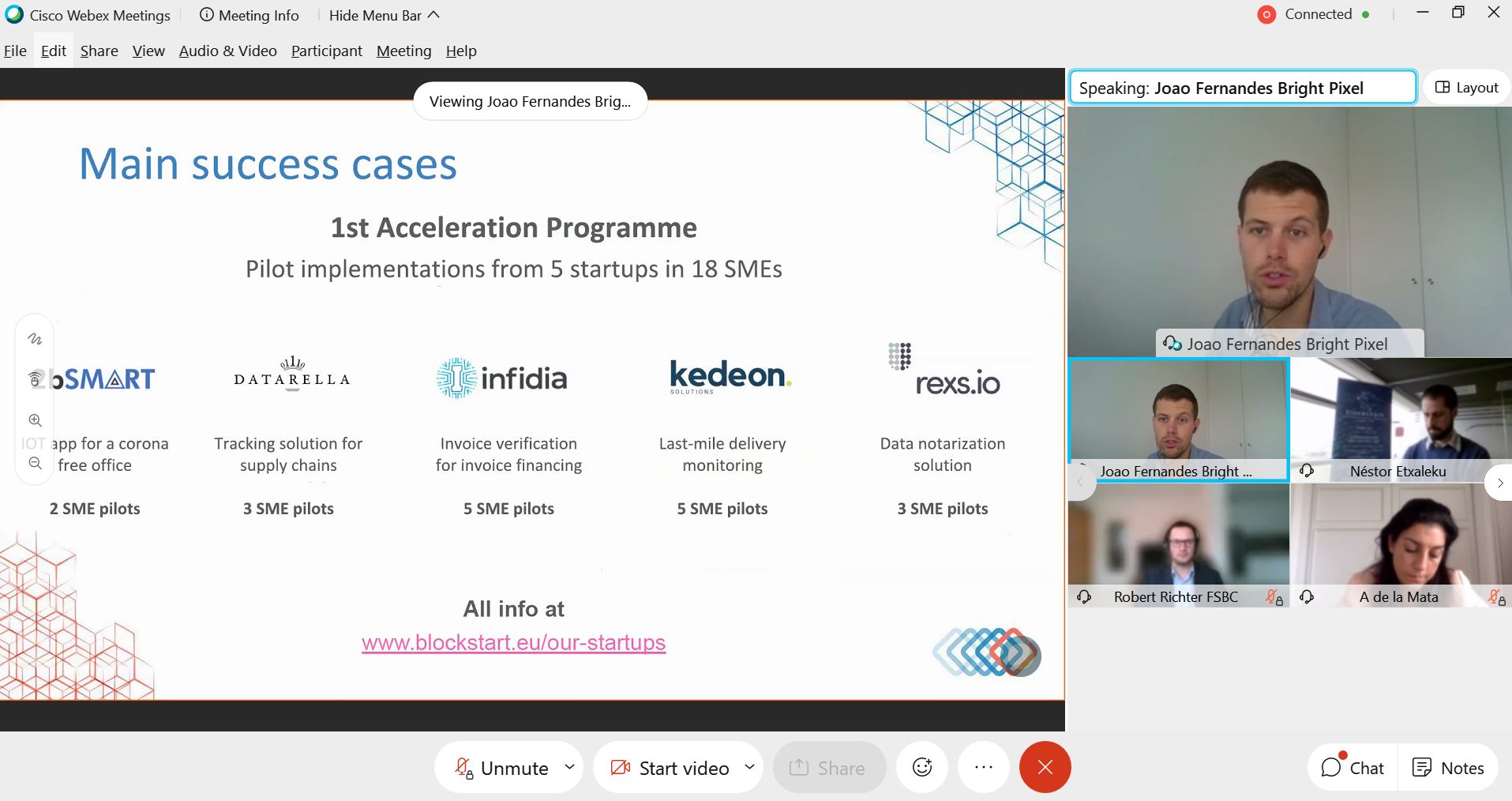On the 28th of January, BlockStart was invited to participate at a working breakfast with EU policymakers, to present its main achievements and discuss policy recommendations on blockchain-related topics
The event was held online on the 28th of January and was organized by fellow blockchain project Blockchers and the European Parliament, with the support of two other blockchain-related projects: BlockStart and Blockpool.
Entitled “How policymakers can support the digitization of European SMEs”, it presented some challenges and policy recommendations related to the future implementation of Distributed Ledged Technologies (DLTs) in Europe as part of Blockchers activities, and a vision of the future of DLTs in Europe by the European Commissions’ Directorate‑General for Communications Networks, Content and Technology (DG Connect) and The Executive Agency for Small and Medium-sized Enterprises (EASME) representatives.
Hosted by MEP Adriana Maldonado López, member of the Committee on the Internal Market and Consumer Protection (IMCO) and substitute on the Committee on Industry, Research and Energy (ITRE) and on the Special Committee on Artificial Intelligence in a Digital Age (AIDA), it became clear that SMEs are the fundamental pilar of Europe’s internal market and digitization should be the tool supporting their growth and internationalization efforts in this digital age. Therefore, it is important for policymakers to listen to them to be aware of the main challenges they face and create or change policies accordingly – which is true for the blockchain and other DLTs sector.
According to Daniel Gassmann, from EASME, there are more than 100 EU projects related with blockchain, running on behalf of the European Commission – BlockStart, Blockchers, Blockpool and Block.IS are some examples – which represents a strong and joint support to DLT/blockchain SMEs across Europe. Other initiatives were also presented by Rapolas Lakavicius, from DG Connect, as part of a blockchain strategy of the European Commission to ensure that the EU is to become a leader in blockchain, which include: a strong political partnership through the European Blockchain Partnership, that decides on common principles for the development of blockchain technologies in the EU; the European Blockchain Services Infrastructure, a joint initiative of the EU and European Economic Area (EEA) Member States as well as the European Commission to develop a common EU strategy on blockchain and build a pan-European blockchain infrastructure for cross-border public services; 200 projects directly related with blockchain application in wide areas of society participating in roundtable discussions promoted by the European Commission “ICT Verticals and Horizontals for Blockchain Standardization”, with the goal of allowing those H2020 projects to present to work done and explore more active involvement into activities of blockchain standardization bodies; and, finally, supporting blockchain interoperability and standards, by engaging and working closely with all relevant bodies around the world (ETSI ISG PDL, ISO TC 307, IEEE, ITU-T, etc.).
Recommendations for policymakers were made by Stefan Schmitt and Denise Duve from the Frankfurt School Blockchain Center, in the scope of their work for Blockchers project. A summary of these recommendations can be found here and the full presentation can be accessed here. According to them, there is an information gap between regulatory institutions and SMEs deploying DLT/blockchain technology, mainly because new technologies are very hard to keep up in terms of policy and regulations as they grow and reach the market at a fast pace. In the case of blockchain technology, it tends to clash with established structures and applicable standards in many areas, due to its decentralized and immutable character. Therefore, recommendations were made at 5 levels – governance, identity framework, digital signatures, euro-on-blockchain and standardization – to eliminate this gap, provide more investment security in this type of technology and achieve innovation in line with EU interest.
Alastria, a non-profit association that fosters the digital economy through the development of blockchain technologies, also gave a speech focused on the main challenges of SMEs when it comes to digitization. According to Almudena de la Mata, traditional SMEs need to engage with digitization in order to improve efficiency and grow their business. However, this is a difficult process since they sometimes do not have the needed resources to digitalize their business models, namely SMEs working in more remote areas and with almost no access to EU funding. Working on awareness and capacity building of these SMEs is thus of utmost importance for the representative of Alastria, whose opinion was shared by MEP Adriana Maldonado López, who emphasised that the EU needs to consider the importance of rural areas.
Finally, Blockchers project was joined by BlockStart and Blockpool as examples of European projects that are currently supporting blockchain SMEs to succeed. BlockStart was presented by its Coordinator, João Fernandes, from Bright Pixel, who made a summary introduction of the programme – its goals and structure – and the startups already supported through this process. 3 blockchain companies – Vottun, Vestigia and Datarella -, the last one supported by BlockStart’s 1st Acceleration Programme, also provided their real-life examples of struggle and growth at EU scale and the importance of the public support provided.

Figure 1: BlockStart’s presentation at the working breakfast
In the end, this great working breakfast sought to foster collaboration with EU institutions, namely by showcasing how several European funded projects are currently supporting DLT and blockchain across Europe. This online session was a good opportunity to also know first-hand the challenges and opportunities to the final uptake of these breakthrough technologies, as blockchain and other DLTs are considered instrumental in shaping Europe’s future.
